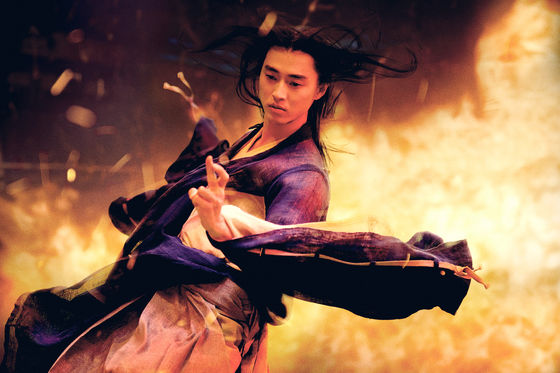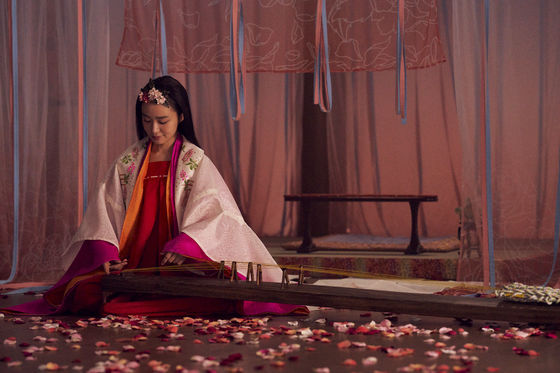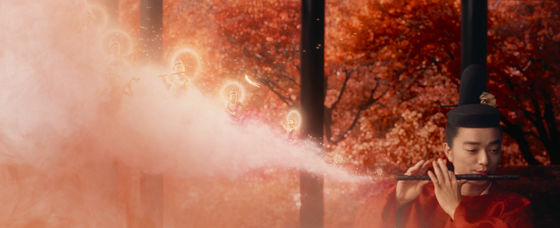An interview with director Tsumako Sato of 'Onmyoji 0,' a film depicting the young Abe no Seimei

Based on Baku Yumemakura's novel 'Onmyoji,' the film 'Onmyoji 0' was released on April 19, 2024. It depicts Abe no Seimei's encounter with his famous buddy Minamoto no Hiromasa when he was still a student at the Onmyo-ryo, and the evil conspiracy and curse that engulfs Heian-kyo. The film's director, Tsumako Sato, has known the original author Baku Yumemakura for 40 years, and has finally realized her long-desired film adaptation. We spoke to Director Sato about the kind of director who created the work that earned Yumemakura's stamp of approval, saying, 'You can have high expectations for it.'
Official website for the movie 'Onmyoji 0' | Released on Friday, April 19, 2024
GIGAZINE (hereinafter, G):
On the website for ' Bunshun Bunko 50th Anniversary x Movie 'Onmyoji 0' ' there is a message from Baku Yumemakura saying, 'A new Abe no Seimei has been born, never seen before,' and 'Everyone, you can have high expectations.'
Director Tsumako Sato (hereinafter, Sato):
That's a very cute thing to say (lol)
G:
You also said, 'When you deal with sorcery in manga or film, anything is possible, so the difficulty is figuring out how to restrain it while still making it look visually appealing. This balance has been achieved very well,' so how did you achieve this balance?
Sato:
First of all, I think that ordinary people don't have much knowledge about jujutsu. Secondly, there are jujutsu nerds, and even among them, the level of knowledge is different. So, there are restrictions on jujutsu, but those are things that only jujutsu nerds who are particularly knowledgeable about it can understand.
G:
I see.
Sato:
I think what Baku is trying to say is that if that happens, it will escalate like in fantasy works, with 'With this magic!' 'Then I'll return it with twice the magic!' 'Transform!' However, this is not the case in this work, and a limit is set from the beginning, drawing a line.
G:
On the official SNS for 'Onmyoji 0', there was a Q&A project called ' Tell me about the movie Onmyoji 0 '. In it, in response to the question 'Why did you depict the young Abe no Seimei?', the director answered, 'Since the original story's Seimei is already complete, I wanted him to struggle.' But what was the reason that you wanted him to struggle?
🗣️ #TellMeAboutTheMovieOnmyoji0
— Movie 'Onmyoji 0' Official (@onmyoji0_movie) March 21, 2024
━━━━v━━━━━
Q. Why did you choose to portray the young Abe no Seimei? #Director Sato Tsumako : 'I think the relationship between Seimei and Hiromasa is the most important (in the original work), so
I wanted to see that encounter.
Also, the original story of Seimei has already been completed,
I also wanted him to struggle.' #Onmyoji0 4/19🎬 pic.twitter.com/9KLM3eVSP9
Sato:
It's very simple, but the protagonist of a story is a character who has to worry, fail, and do various things. However, Baku's Seimei is a detached presence who watches over the others, and it is Hiromasa's role to make mistakes. That makes Hiromasa seem like the protagonist. Since the protagonist is Abe no Seimei, Seimei has to fail and recover... and I thought that this would only be possible if he was young.
Kento Yamazaki plays Abe no Seimei in his younger days

G:
So there was a clear reason. Even if you were to make the character younger, I'm sure you could have set him to a number of different ages, but why did you choose the age he is at in this film?
Sato:
This is because the story is set in the second year of
Nao plays Princess Kishi, who is known as Saigūno Nyōgo, one of the Thirty-six Immortal Poets, and excels in waka poetry, koto, and calligraphy.

G:
I see, so that's how you chose it. That's great timing.
Sato:
I had made a timeline listing who was doing what at the time and who the ministers were, so I chose the most appropriate years from that.
G:
When I researched this interview, I found that the director had done extensive research on 'Onmyoji,' and at a special preview screening held in Oshu City, he
Sato:
That's right (laughs). Baku's novel is a buddy story between Abe no Seimei and Minamoto no Hiromasa, but while Seimei was fairly well-known, Hiromasa wasn't that famous at the time the novel was written. I was interested in who Hiromasa was, but at the same time, I felt really uncomfortable with the fact that it was written as a 'samurai'... 'A samurai in the imperial court during the Heian period? There was the Taira no Masakado Rebellion , so maybe he was a Kanto warrior?'
G:
Ah, I see.
Sato:
So I looked it up at the National Diet Library and found out that he was a very famous genius in the gagaku world who wrote 'Hakugafu'. But they made him a samurai and I was like, 'Baku-san! What a thing to do!' (laughs)
G:
So, I decided to send the materials.
Sato:
I immediately sent it to Baku-san and Reiko Okano. I don't know if I sent it by mail or by fax... but I think I sent it by fax to Okano-san. When I had the contents of the book copied at the National Diet Library, the paper was very large and expensive at the time (laughs). It seems to be a bit more convenient now, though.
G:
Apparently Baku Yumemakura's only requests for the film were that the spell be spoken out loud and that the Bodhisattva of the Clouds appear. I understand the spell, but what is the Bodhisattva of the Clouds...?
Sato:
The Unchuu Bodhisattva is a wooden statue carved at Byodo-in Temple and other places, depicting a bodhisattva playing gagaku on an instrument. It's a bodhisattva that symbolizes music, and since I was just asked to include it, I think it would have been fine to include it anywhere... but it would be better if the final boss was an Unchuu Bodhisattva (laughs).
G:
No no no (lol)
Sato:
However, I still thought that this should come from Hiromasa's flute, so that's how I ended up making that entrance.
Minamoto Hiromasa played by Shota Sometani

G:
This is not a question that is directly related to the work, but Director Sato has been active since before the Internet became widespread, and if you just search online, you will find that old information is missing and difficult to find, so I would like to ask you about it. In June 2023, upon the death of Julian Sands, the director mentioned that he had Julian Sands appear in his debut film, ' Virginia .' There is no DVD or Blu-ray of 'Virginia,' and the VHS version has become a premium and is selling for 17,000 yen, so why did you choose a vampire as the subject of your first film?
I'm at a loss for words after hearing that Julian Sands has passed away.
— Sato Shimako (@satoshimako) June 28, 2023
She willingly appeared in my debut vampire film 'Virginia.' It was a low-budget film by a former student.
I can still hear that deep voice in my head.
It's tall so it falls from above my head.
I'd love to meet you in Tokyo someday.
Rest in Peace
Sato:
That's because I'm a big fan of Moto Hagio (laughs).
G:
So Hagio's message was included in the pamphlet at that time.
Sato:
When I was at the London Film School, I wanted to film Hagio's short story ' Hanshin ' for my graduation project. The story was also adapted by Hideki Noda as a stage play, so I wrote to Shogakukan asking for their permission to make it for my graduation project. Yamamoto, the famous editor-in-chief, forwarded the letter to Hagio, who replied directly to me, 'Sure.'
G:
oh!
Sato:
I thought, 'I did it!' and made it, and it was very well received, winning awards at various film festivals, and my next film was 'Virginia.' I shot it in 1992, and I think it was released in the US in 1992 or 1993. In Japan, it was going to be shown at the Fantastic Film Festival in Shibuya, and at that time, Hagio came to visit me in my dressing room. However, we happened to miss each other, so I said to myself, 'I wish I could have met you if you had come,' and then Baku invited me to a meal with Hagio, Okano Reiko, and Tezuka Makoto. Hagio is like a god to me, so I was like, 'I met a god!' and I was shaking and all (laughs).
G:
(lol)
Sato:
I was 27 or 28 years old at the time. By the way, my husband ( Takashi Yamazaki, director) met Spielberg recently and said that he had met God, so I told him, 'That's great. I met him when I was in my 20s.' (laughs)
G:
What a sense of ease (lol)! In the pamphlet from that time, Baku Yumemakura had a message that said, 'From the very beginning, Tsumako Sato has worked with the world in mind. This is probably rare in the history of Japanese cinema. At last, a director like this has appeared. Her youth, her being a woman, and the individuality of Tsumako Sato - all of these things are weapons for an artist.'
Sato:
It's very Baku-like and passionate.
G:
At the time, did Baku ever say anything like this to you directly?
Sato:
When Baku was an amateur, he was told, 'You should give up on a normal life and become a writer. I don't know if you'll be successful, but you're one of those people,' and that's what made him want to become a writer. He said something similar to that: 'You're one of those people.' When he said that, I just thought, 'Yes,' and that was the end of it (laughs).
G:
(Laughs) Your social media is very interesting and I keep digging up old posts, but in 2021 you posted, 'Ever since I was old enough to understand, I had always wondered what people live for, but when I was 12 years old, I found the answer that people live to do what they really want to do.' How on earth did you come up with this answer at the age of 12?
I saw this post because Tatsumi-sensei retweeted it. Ever since I was old enough to understand, I had always wondered what people live for, but when I was 12 years old, I found the answer that people live to do what they really want to do. So even now, I believe that no matter how old you are, you should do what you really want to do. https://t.co/t3l9DaLbZk
— Sato Shimako (@satoshimako) February 20, 2021
Sato:
I have memories from when I was about 2 years old or even earlier. Ever since then, I've always wondered, 'Why do people live?'
G:
From the beginning, as far as you can remember?
Sato:
From the beginning. So I kept searching for the answer, and then when I was 12 years old, I had an epiphany: 'People live for the things they want to do.'
G:
Was there some kind of spark that gave you the idea?
Sato:
I don't remember the situation itself. The reason is that I've been thinking about it for almost 10 years. The film talks about the collective unconscious, but I have a feeling that something like that might actually exist. Since I was a child, I already had knowledge about a lot of things. When I saw something on TV, I'd say, 'They're doing this story again,' or 'I already know that,' and I wondered why people in the world only do things they already know. It may sound like a strange kindergartener, but I thought, 'Isn't everyone like that? Aren't they just hiding it?' I thought, 'They don't say anything because no one asks' (laughs).
G:
Director Sato mentioned that one of the reasons he decided to pursue a career in film was because Katsuya Terada was one year above him at school.
There was a guy named Katsuya Terada in the year above me at school, and he was incredibly good at drawing, but he wasn't a professional yet. I thought that if he wasn't a professional yet, I'd never be able to become one, so instead of illustration, I went into the video industry and became a professional there. That's what happens sometimes. For reference. https://t.co/zHLXi65Dyb
— Sato Shimako (@satoshimako) January 17, 2021
Sato:
This happened at Asagaya Art College. Takashi Yamazaki was there and was in the same class as me. Also, Katsuya Terada and Takayuki Takeya , who were one year above me, were in the same class. A little higher up were Masakazu Katsura from 'Wingman' and Keita Amemiya from 'GARO'. Terada and Takeya, who are one year above me and Takashi Yamazaki, are in the hardcore otaku zone, aren't they (laughs)?
G:
(lol)
Sato:
Everyone in this area knows each other and we often go out to eat together, and I'd visit their homes and look at Takeya's sculptures, so I think it's a strange relationship.
G:
I'd like to ask you about this mysterious connection. Director Tomohiko Iwasaki talked about his memories of the Yubari International Fantastic Film Festival, where he and Tarantino played reservoirs on the snow. How on earth would you end up playing reservoirs with Tarantino? (laughs)
Come to think of it, I did that. https://t.co/YSK4Ox0CXy
— Sato Shimako (@satoshimako) March 4, 2024
Sato:
We did (laughs). After the screening of 'Reservoir Dogs,' we exchanged comments like, 'That was funny,' and 'Who was your favorite?', and then we decided to actually play Reservoir. My memory of Yubari is when I asked Michelle Yeoh to do a spin kick for me (laughs).
G:
That makes me jealous (laughs). From what I've heard, I get the impression that you're not afraid to jump into any kind of environment, but has that been your personality since you were a child?
Sato:
It was after I went to a film school in London. The reason I decided to go was because I was about 19 years old and traveled to Thailand, Malaysia, and Singapore with friends for about a month. My friends could speak English, so they seemed to be having a great time, but I was left out, and when I returned to Japan, I thought, 'If I can't speak English, this world is a mess.'
G:
So you learned this firsthand.
Sato:
At the time, I was taking an animation seminar at school, but it takes about three months to make three minutes of animation. With live-action, you can shoot three minutes and have three minutes of footage, so I thought live-action would be the way to go, but there were no teachers who could teach me live-action, so I decided to study abroad because I thought, 'It's a waste of time, so I want to study English and film at the same time.'
G:
amazing…….
Sato:
My options were America and England, but since it was a long time ago, my parents said America was 'dangerous.'Also, I loved Monty Python and Hitchcock, so England was the best place for me, and that's how I ended up studying abroad in England.
G:
I believe you met Baku Yumemakura when you were around 19 years old. In an interview with Baku published in Mynavi News , it was mentioned that before Baku wrote 'Onmyoji', Director Sato was serving as a member of the Japan Science Fiction Convention's steering committee. Why did you decide to become a member of the Japan Science Fiction Convention's steering committee?
Sato:
The famous Japanese SF Convention was 'DAICON', whose opening video was created by Hideaki Anno and his team, and the following year it was 'EZOCON', held in Hokkaido. I've always loved SF, and since I was in the manga research club in high school I've always been into SF, so I think a manga artist who would later go on to become a professional approached me and asked if I could help out as they didn't have enough organizing committee members.
G:
So you were a science fiction fan.
Sato:
I've loved it since I was a child, and I read ' Dune ' when I was in about fifth grade, and I also read Arthur C. Clarke.
G:
I see. It makes a lot of sense that Director Sato, with such a background, created 'Onmyoji 0.' What do you think are the highlights of this work?
Sato:
In Japan, I don't think you often see movies that depict dragons like this one. Western dragons are often thought of as snakes, but I think that Eastern dragons are like energy bodies that are likened to dragons, so I definitely wanted to do this dragon this time. I'm really happy that I was able to do it. Fire, water, and all those elements were simulated, so it took a hellish amount of calculation time and was extremely difficult, to the point where we felt like we didn't have enough time if we didn't give the OK early, but I think we were able to create a satisfactory image. Please go see it at the theater.
G:
thank you.
The movie 'Onmyoji 0' is now being released in theaters nationwide from Friday, April 19, 2024.
Movie 'Onmyoji 0' official trailer released on April 19, 2024 (Friday) - YouTube
◆ 'Onmyoji 0' work information
Cast: Kento Yamazaki, Shota Sometani, Nao, Masanobu Ando, Nijiro Murakami, Rihito Itagaki, Jun Kunimura, Kazuki Kitamura, Kaoru Kobayashi
Original work: Baku Yumemakura's 'Onmyoji' series (Bungeishunju)
Screenplay and Director: Tsumako Sato
Music: Naoki Sato
Theme song: BUMP OF CHICKEN 'Encounter' (TOY'S FACTORY)
Magic Supervision: Nanami Kamon
Distributor: Warner Bros. Pictures
©2024映画「陰陽師0」製作委員会
Related Posts:







